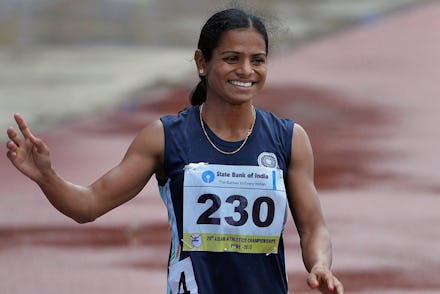This Star Athlete Has Been Stripped of Her Olympic Chances for the Most Unfair Reason

A regressive set of guidelines from the International Olympic Committee have failed a bright young Indian athlete and stalled her track and field career.
Dutee Chand, 18, turned heads last year as the national champion in the 100 and 200 meters. But after a series of standout performances this year — at the World Youth Championships, where she became the first Indian to reach the final of an international 100-meter event, and the 16th Asian Junior Championship, where she won two gold medals — she came under the radar of India's sports officials. Not just for her outlier performances but for their anxiety at the age-old binary question — is Chand really a woman?
The Sports Authority of India made Chand undergo testosterone level evaluation — just a semantically more sophisticated way of the much-criticized sex determination test. And the results were heartbreaking: Because her body produced more testosterone than is "normal" in women, Chand was dropped from the 2014 Glasgow Commonwealth Games squad days before the team was scheduled to leave. She was subsequently banned from competing in international events.
The IOC considers higher levels of testosterone in women as an "unfair" advantage over other competitors, and if such athletes want to continue competing they may either undergo surgery or medically reduce testosterone levels. But the "unfair advantage" is simply a perceived threat. It hasn't been proven that a higher volume of natural testosterone impacts athletic success.
In Chand's case, she hasn't doped and she hasn't cheated. Her body just produces more testosterone. There shouldn't be an expectation that women athletes can only be a certain kind. As a New York Times op-ed says: "There is no reason to disqualify women whose bodies produce any of the complex ingredients that add up to athleticism, be they superb vision, big lungs, flexibility, long legs or testosterone."
Another Indian athlete, Santhi Soundarajan, was stripped of her 2006 Asian Games silver medal in the 800 meters because she failed a gender test that cited she "does not possess the sexual characteristics of a woman." The more prominent sex-based discrimination in a similar case came forward in 2009, when South Africa's 800-meter world champion Caster Semenya was flagged by the International Association of Athletics Federations for gender testing. After worldwide criticism against how Semenya was treated, the IOC made changes to its policy before the 2012 London Olympics.
The IOC wants to harp on it loud and clear that the new policy is not sex determination anymore. But what's happening is still appalling in 2014. The IOC and IAAF call it "regulations on female hyperandrogenism." Translation: They want women to check every box that they have laid out and make sure you are female enough to compete as a woman.
Because she didn't fit in the clean-cut box, Chand will lose four crucial years before she'll be able to participate in the Commonwealth or Asian games again. While she remains banned from international competition, the Indian sports authority has given her a ray of hope, inviting her back to the training camps — but not without a clause: She'll have to consult a doctor on ways to reduce her androgen level.
These rulings establish a dangerous precedent. By persecuting athletes over selective criteria — by demanding they confirm to subjective standards of feminity — the IOC is betraying the very fairness they've set out to protect.